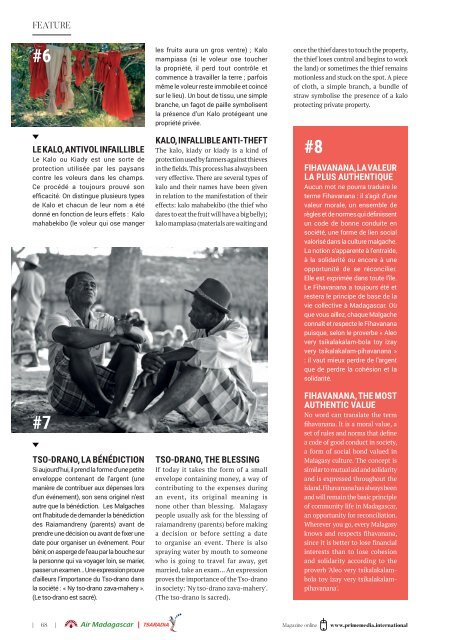Prime Magazine January 2020
You also want an ePaper? Increase the reach of your titles
YUMPU automatically turns print PDFs into web optimized ePapers that Google loves.
FEATURE<br />
#6<br />
LE KALO, ANTIVOL INFAILLIBLE<br />
Le Kalo ou Kiady est une sorte de<br />
protection utilisée par les paysans<br />
contre les voleurs dans les champs.<br />
Ce procédé a toujours prouvé son<br />
efficacité. On distingue plusieurs types<br />
de Kalo et chacun de leur nom a été<br />
donné en fonction de leurs effets : Kalo<br />
mahabekibo (le voleur qui ose manger<br />
#7<br />
TSO-DRANO, LA BÉNÉDICTION<br />
Si aujourd’hui, il prend la forme d’une petite<br />
enveloppe contenant de l’argent (une<br />
manière de contribuer aux dépenses lors<br />
d’un événement), son sens originel n’est<br />
autre que la bénédiction. Les Malgaches<br />
ont l’habitude de demander la bénédiction<br />
des Raiamandreny (parents) avant de<br />
prendre une décision ou avant de fixer une<br />
date pour organiser un événement. Pour<br />
bénir, on asperge de l’eau par la bouche sur<br />
la personne qui va voyager loin, se marier,<br />
passer un examen… Une expression prouve<br />
d’ailleurs l’importance du Tso-drano dans<br />
la société : « Ny tso-drano zava-mahery ».<br />
(Le tso-drano est sacré).<br />
les fruits aura un gros ventre) ; Kalo<br />
mampiasa (si le voleur ose toucher<br />
la propriété, il perd tout contrôle et<br />
commence à travailler la terre ; parfois<br />
même le voleur reste immobile et coincé<br />
sur le lieu). Un bout de tissu, une simple<br />
branche, un fagot de paille symbolisent<br />
la présence d’un Kalo protégeant une<br />
propriété privée.<br />
KALO, INFALLIBLE ANTI-THEFT<br />
The kalo, kiady or kiady is a kind of<br />
protection used by farmers against thieves<br />
in the fields. This process has always been<br />
very effective. There are several types of<br />
kalo and their names have been given<br />
in relation to the manifestation of their<br />
effects: kalo mahabekibo (the thief who<br />
dares to eat the fruit will have a big belly);<br />
kalo mampiasa (materials are waiting and<br />
TSO-DRANO, THE BLESSING<br />
If today it takes the form of a small<br />
envelope containing money, a way of<br />
contributing to the expenses during<br />
an event, its original meaning is<br />
none other than blessing. Malagasy<br />
people usually ask for the blessing of<br />
raiamandreny (parents) before making<br />
a decision or before setting a date<br />
to organise an event. There is also<br />
spraying water by mouth to someone<br />
who is going to travel far away, get<br />
married, take an exam... An expression<br />
proves the importance of the Tso-drano<br />
in society: 'Ny tso-drano zava-mahery'.<br />
(The tso-drano is sacred).<br />
once the thief dares to touch the property,<br />
the thief loses control and begins to work<br />
the land) or sometimes the thief remains<br />
motionless and stuck on the spot. A piece<br />
of cloth, a simple branch, a bundle of<br />
straw symbolise the presence of a kalo<br />
protecting private property.<br />
#8<br />
FIHAVANANA, LA VALEUR<br />
LA PLUS AUTHENTIQUE<br />
Aucun mot ne pourra traduire le<br />
terme Fihavanana : il s’agit d’une<br />
valeur morale, un ensemble de<br />
règles et de normes qui définissent<br />
un code de bonne conduite en<br />
société, une forme de lien social<br />
valorisé dans la culture malgache.<br />
La notion s’apparente à l’entraide,<br />
à la solidarité ou encore à une<br />
opportunité de se réconcilier.<br />
Elle est exprimée dans toute l’île.<br />
Le Fihavanana a toujours été et<br />
restera le principe de base de la<br />
vie collective à Madagascar. Où<br />
que vous aillez, chaque Malgache<br />
connaît et respecte le Fihavanana<br />
puisque, selon le proverbe « Aleo<br />
very tsikalakalam-bola toy izay<br />
very tsikalakalam-pihavanana »<br />
: il vaut mieux perdre de l’argent<br />
que de perdre la cohésion et la<br />
solidarité.<br />
FIHAVANANA, THE MOST<br />
AUTHENTIC VALUE<br />
No word can translate the term<br />
fihavanana. It is a moral value, a<br />
set of rules and norms that define<br />
a code of good conduct in society,<br />
a form of social bond valued in<br />
Malagasy culture. The concept is<br />
similar to mutual aid and solidarity<br />
and is expressed throughout the<br />
island. Fihavanana has always been<br />
and will remain the basic principle<br />
of community life in Madagascar,<br />
an opportunity for reconciliation.<br />
Wherever you go, every Malagasy<br />
knows and respects fihavanana,<br />
since it is better to lose financial<br />
interests than to lose cohesion<br />
and solidarity according to the<br />
proverb 'Aleo very tsikalakalambola<br />
toy izay very tsikalakalampihavanana'.<br />
| 68 | <strong>Magazine</strong> online www.primemedia.international

















